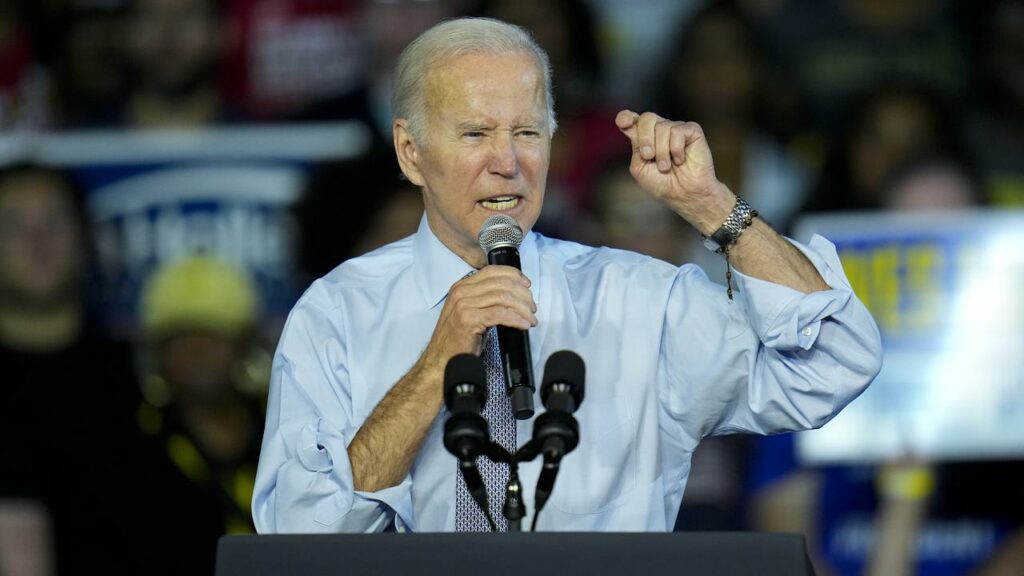Biden’s power on the ballot in US midterms
Joseph Ax |

Americans are casting ballots in midterm elections that will determine whether Democrats lose control of Congress, and with it the ability to push forward on President Joe Biden’s agenda in the next two years.
The party that controls the White House typically loses seats in midterm elections, and nonpartisan forecasts suggest Tuesday’s results will be no exception.
Concerns about high inflation and crime outweigh the end of national abortion rights and the violence of the January 6, 2021, assault on the Capitol in voters’ minds.
Thirty-five Senate seats and all 435 House of Representatives seats are on the ballot.
Republicans are widely favoured to pick up the five seats they need to control the House, while the Senate – currently split 50-50 with Democrats holding the tie-breaking vote – could come down to a quartet of toss-up races in Pennsylvania, Nevada, Georgia and Arizona.
But even before the midterm elections were completed, the 2024 presidential election was taking shape.
Former President Donald Trump on Monday night sent his strongest hint yet that he would be kicking off his third consecutive White House campaign soon, telling supporters in Ohio that he would be making a “big announcement” on November 15.
Hundreds of supporters of Trump’s false claims that his loss was the result of widespread fraud are on the ballot this year, including several seeking positions that would give them direct oversight of the 2024 president elections in competitive states.
More than 42 million Americans voted ahead of Election Day, either by mail or in-person, according to data from the US Election Project. State election officials caution that full results may not be known for days afterward as they count ballots in close races – with control of the Senate perhaps not known until a potential December 6 runoff in Georgia.
A Republican-controlled House would be able to block bills addressing Democratic priorities such as abortion rights and climate change.
Republicans could also initiate a showdown over the nation’s debt ceiling, which could shake financial markets, and launch potentially politically damaging investigations into Biden’s administration and family.
Republicans would look to use their leverage to make the 2017 individual tax cuts passed under Trump permanent, and protect corporate tax cuts that Democrats have unsuccessfully tried to reverse over the past two years.
A Republican Senate, meanwhile, would hold sway over Biden’s judicial nominations, including any Supreme Court vacancy.
Divided government would intensify the spotlight on the increasingly conservative court, which has already issued sweeping decisions erasing a nationwide right to abortion and vastly expanding gun rights, among others.
There are also 36 governorships and scores of other state-level races on the ballot, including hotly contested gubernatorial campaigns in the swing states of Michigan, Wisconsin, Nevada, Arizona and Georgia.
Biden and former President Barack Obama, still the party’s biggest luminary, have crisscrossed the country over the past week, urging supporters to vote in hopes of stemming Democrats’ losses, while Trump has done the same as he lays the groundwork for another run at the presidency.
However, some Democrats in tough races have deliberately distanced themselves from the White House as Biden’s popularity languishes.
Despite one of the strongest job markets in memory, stubbornly rising prices have left voters dissatisfied, helped along by relentless attacks from Republicans over petrol and food prices, as well as crime.
Biden and other Democrats have sounded the alarm over a raft of Republican contenders who have either echoed or refused to contradict Trump’s false claims that he lost the 2020 election due to widespread fraud.
“Democracy is literally on the ballot,” Biden said on Sunday at a rally in Yonkers, New York.
The prevalence of election deniers among Republican candidates has elevated down-ballot races that typically receive little attention, including contests for secretary of state, the top election official in most states.
In swing states such as Nevada, Arizona and Michigan, the Republican nominees to head up the states’ election apparatus have embraced Trump’s falsehoods, raising fears among Democrats that, if they prevail, they could interfere with the 2024 presidential race.
Reuters


